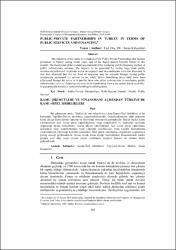| dc.contributor.author | Kılıçaslan, Harun | |
| dc.date.accessioned | 2017-07-06T08:06:18Z | |
| dc.date.available | 2017-07-06T08:06:18Z | |
| dc.date.issued | 2016-12 | |
| dc.identifier.uri | https://hdl.handle.net/20.500.11776/1809 | |
| dc.description | International Congress of Management Economy And Policy, 26-27 Kasım 2016, İstanbul | en_US |
| dc.description.abstract | Bu çalışmanın amacı, Türkiye’de son yıllarda öne çıkan Kamu-Özel İşbirlikleri ve bu kapsamda Yap-İşlet-Devret modelinin değerlendirilmesidir. Değerlendirmenin odak noktasını kamu altyapı hizmetlerinin sunumu ve finansman yöntemi oluşturmaktadır. Büyük ölçekli kamu yatırımlarının özel kesim eliyle yaptırılmasının vergi mükellefleri ve seçmenler açısından doğuracağı etkiler tartışılmıştır. Kamu altyapı yatırımlarının özel kesim eliyle yaptırılması sonucunda vergi mükelleflerinin vergi yükünün azalabileceği, buna karşılık hizmetlerden yararlananların ödeyeceği bedeller neticesinde fiktif olarak yararlanma vergilerinin uygulamaya girmiş olacağı görülmektedir. Sonuç olarak kamu altyapı hizmetlerinin finansmanında ödeme gücünü esas alan vergi sistemi yerine yararlanma vergileri benzeri bir sisteme doğru gidilmektedir. | en_US |
| dc.description.abstract | The objective of this study is evaluation of the Public-Private Partnerships that became prominent in Turkey during recent years, and of the Build-Operate-Transfer Model in this context. The focal point of the evaluation comprised of the rendering and the financing method of public infrastructure services. The impacts to be generated by having large scale public investments performed via private sector on taxpayers and on constituents were also discussed. It was thus observed that the tax load of taxpayers may be reduced through having public investments performed via private sector, while fictive benefitting taxes shall have been effectuated through the prices to be paid by those who utilise such services. In conclusion, public infrastructure services' financing was seen to be transitioning from a tax system based on ability-to-pay principle towards a system resembling benefitting taxes. | en_US |
| dc.language.iso | tur | en_US |
| dc.publisher | Namık Kemal Üniversitesi,İktisadi ve İdari Bilimler Fakültesi | en_US |
| dc.rights | info:eu-repo/semantics/openAccess | en_US |
| dc.subject | Kamu-Özel İşbirlikleri | en_US |
| dc.subject | Yap-İşlet-Devret Modeli | en_US |
| dc.subject | Kamu Hizmetleri | en_US |
| dc.subject | Public-Private Partnerships | en_US |
| dc.subject | Build-Operate-Transfer Model | en_US |
| dc.subject | Public Services | en_US |
| dc.title | KAMU HİZMETLERİ VE FİNANSMANI AÇISINDAN TÜRKİYE’DE KAMU-ÖZEL İŞBİRLİKLERİ | en_US |
| dc.title.alternative | PUBLIC-PRIVATE PARTNERSHIPS IN TURKEY IN TERMS OF PUBLIC SERVICES AND FINANCING | en_US |
| dc.type | article | en_US |
| dc.relation.ispartof | Balkan Sosyal Bilimler Dergisi | en_US |
| dc.department | Tekirdağ Namık Kemal Üniversitesi Dergileri | en_US |
| dc.authorid | 12703 | en_US |
| dc.identifier.startpage | 385 | en_US |
| dc.identifier.endpage | 398 | en_US |
| dc.relation.publicationcategory | Makale - Ulusal Hakemli Dergi - Kurum Öğretim Elemanı | en_US |



















